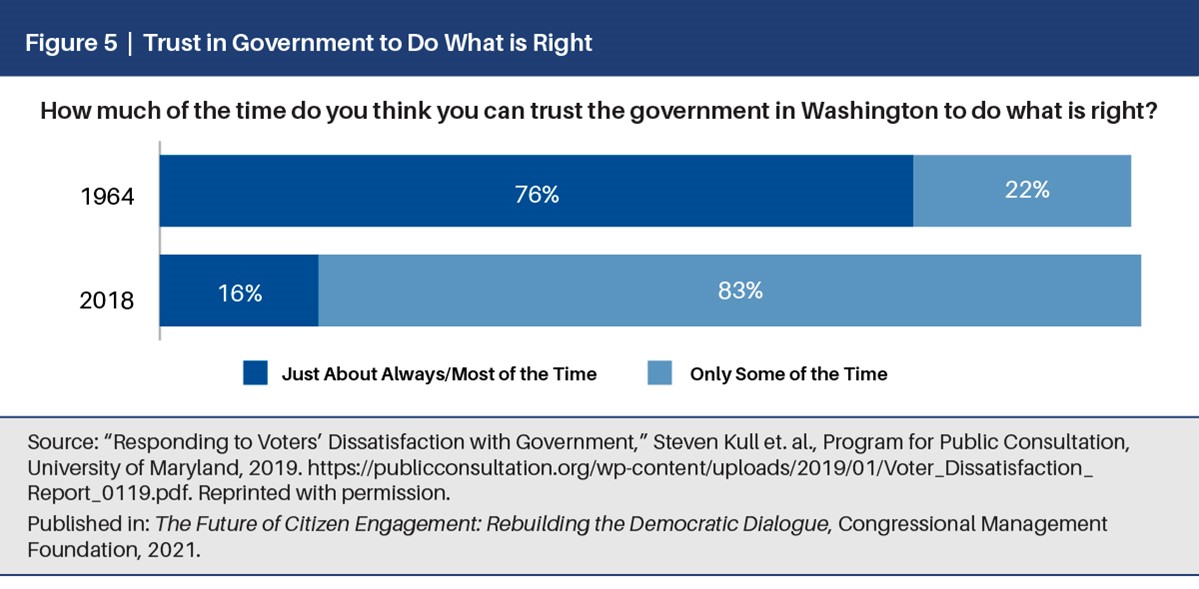This is an excerpt from The Future of Citizen Engagement: Rebuilding the Democratic Dialogue. Most citations have been removed but can be found in the full report. Select resources are included as links at the end of this post.
As discussed in the CMF report The Future of Citizen Engagement: What Americans Want from Congress & How Members Can Build Trust, constituents value the relationship between Members of Congress and those they represent. They want to feel heard, but they do not feel Congress is listening. They do not think government or Congress works for them. Data collected over decades indicates that we are near an all-time high (89%) of Americans who believe that the government is run by big interests looking out for themselves, not for the benefit of all people. In fact, the percentage who feel the government is run by a few big interests has climbed dramatically since the 1960s when significantly higher percentages of Americans believed government was run for the benefit of all the people.
Moreover, voters overwhelmingly feel Members of Congress: think mostly about their party, not the good of the country; do not listen to the people they represent; and would be more likely to find common ground if they were more influenced by the people they represent.
Trust in government has declined dramatically since the 1960s, as well. Where in 1964 more than three-quarters (76%) of Americans said they trusted government to do what is right “just about always” or “most of the time,” now four in five (83%) Americans say they can trust the government to do what is right “only some of the time.”

In 2019, voters were asked how much elected officials should listen to and be influenced by the views of the people they represent. Using a scale of one to 10, with one being least influenced and 10 being most influenced, the average score was 8.8. They felt that elected officials should listen to and be significantly influenced by the views of their constituents. The voters were then asked how much most Members of Congress actually do listen to and are influenced by the views of the people they represent. The average was 4.0. Finally, they were asked about their own Representative, and the average was 5.1. Those are sizeable gaps between what voters think Members should do and actually do. They feel that Senators and Representative should be deeply influenced by their constituents, but they do not feel that they actually are. Also, nearly half of the respondents had “very” (23%) or “somewhat” (27%) unfavorable views of their own Representative, and 52% felt their Representative did not deserve to be re-elected.
CMF knows that Members of Congress care deeply about their constituents, with most (95%) of the House Members surveyed about their work life rating “staying in touch with constituents” as the job aspect most critical to their effectiveness. In fact, it was the most important factor to their job satisfaction, followed by their relationship with their staff. Even family, colleagues, and friends rated far lower in importance. We also know that, as we discussed in our report Life in Congress: The Member Perspective:
“Americans possess a limited, and somewhat distorted, view of what it’s like to be a Member of Congress. Most news stories feature the negative motivations of legislators and most portrayals of Members of Congress by the entertainment industry further reinforce the stereotype that they are lazy, self-interested, and corrupt. Members themselves add to the criticism by lauding their own virtues while decrying their colleagues and Congress as an institution.”
We also know that, if Members have the opportunity to have substantive, deliberative discussions with constituents, they are able to explain their views and can change constituents’ minds about their handling of an issue and their performance, in general. The fact remains, however, that the overwhelming perception among the People is that Congress does not care about them and does not trust it to do right by them.
Additional Resources
- The Future of Citizen Engagement: Rebuilding the Democratic Dialogue (CMF)
- The Future of Citizen Engagement: What Americans Want from Congress & How Members Can Build Trust (CMF)
- Citizen-Centric Advocacy: The Untapped Power of Constituent Engagement (CMF)
- “Responding to Voters’ Dissatisfaction with Government” (Steven Kull et. al., Program for Public Consultation, University of Maryland, 2019)
- “Can Members of Congress Change Your Mind? Yes, They Just Have to Talk to You” (David Lazer and Michael Neblo, Politico Magazine, April 19, 2015)


